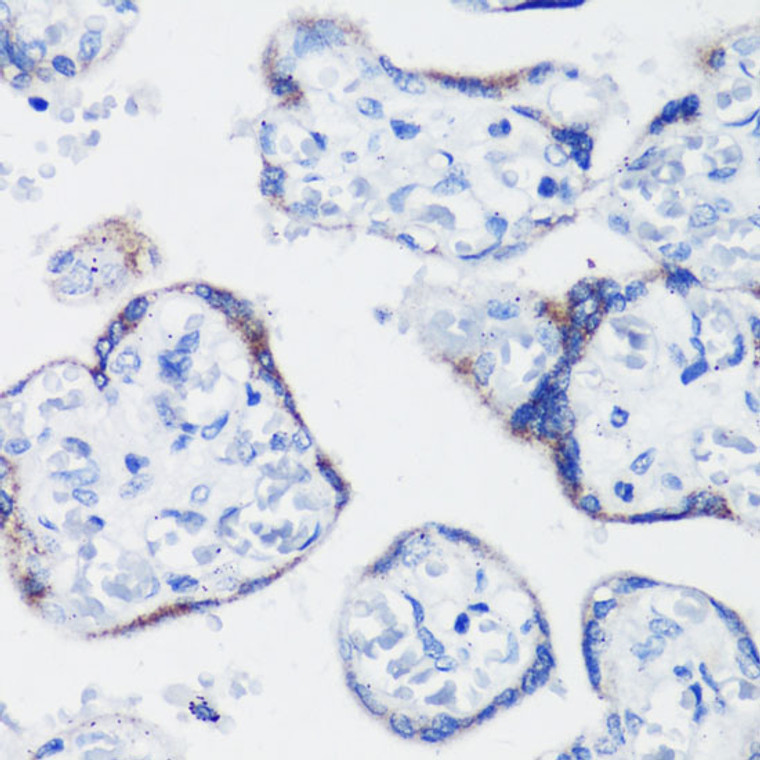| Host: |
Rabbit |
| Applications: |
WB/IHC |
| Reactivity: |
Human/Mouse |
| Note: |
STRICTLY FOR FURTHER SCIENTIFIC RESEARCH USE ONLY (RUO). MUST NOT TO BE USED IN DIAGNOSTIC OR THERAPEUTIC APPLICATIONS. |
| Short Description: |
Rabbit polyclonal antibody anti-KISS1 (124-138) is suitable for use in Western Blot and Immunohistochemistry research applications. |
| Clonality: |
Polyclonal |
| Conjugation: |
Unconjugated |
| Isotype: |
IgG |
| Formulation: |
PBS with 0.01% Thimerosal, 50% Glycerol, pH7.3. |
| Purification: |
Affinity purification |
| Dilution Range: |
WB 1:500-1:2000IHC-P 1:50-1:200 |
| Storage Instruction: |
Store at-20°C for up to 1 year from the date of receipt, and avoid repeat freeze-thaw cycles. |
| Gene Symbol: |
KISS1 |
| Gene ID: |
3814 |
| Uniprot ID: |
KISS1_HUMAN |
| Immunogen Region: |
124-138 |
| Immunogen: |
A synthetic peptide corresponding to a sequence within amino acids 124-138 of human KISS1 (NP_002247.3). |
| Immunogen Sequence: |
REAAPGNHGRSAGRG |
| Tissue Specificity | Very high expression in placenta, with the next highest level in testis and moderate levels in pancreas, liver, small intestine and brain at much lower levels. Expression levels increased in both early placentas and molar pregnancies and are reduced in choriocarcinoma cells. Expressed at higher levels in first trimester trophoblasts than at term of gestation, but only expressed in the villous trophoblast. |
| Post Translational Modifications | Processed by MMP2 and MMP9. |
| Function | Metastasis suppressor protein in malignant melanomas and in some breast cancers. May regulate events downstream of cell-matrix adhesion, perhaps involving cytoskeletal reorganization. Generates a C-terminally amidated peptide, metastin which functions as the endogenous ligand of the G-protein coupled receptor GPR54. Activation of the receptor inhibits cell proliferation and cell migration, key characteristics of tumor metastasis. Kp-10 is a decapeptide derived from the primary translation product, isolated in conditioned medium of first trimester trophoblast. Kp-10, but not other kisspeptins, increased intracellular Ca(2+) levels in isolated first trimester trophoblasts. Kp-10 is a paracrine/endocrine regulator in fine-tuning trophoblast invasion generated by the trophoblast itself. The receptor is also essential for normal gonadotropin-released hormone physiology and for puberty. The hypothalamic KiSS1/GPR54 system is a pivotal factor in central regulation of the gonadotropic axis at puberty and in adulthood. |
| Protein Name | Metastasis-Suppressor Kiss-1Kisspeptin-1 Cleaved Into - MetastinKisspeptin-54 - Kisspeptin-14 - Kisspeptin-13 - Kisspeptin-10 |
| Database Links | Reactome: R-HSA-375276Reactome: R-HSA-416476 |
| Cellular Localisation | Secreted |
| Alternative Antibody Names | Anti-Metastasis-Suppressor Kiss-1 antibodyAnti-Kisspeptin-1 Cleaved Into - Metastin antibodyAnti-Kisspeptin-54 - Kisspeptin-14 - Kisspeptin-13 - Kisspeptin-10 antibodyAnti-KISS1 antibodyAnti-PP5098 antibody |
Information sourced from Uniprot.org
12 months for antibodies. 6 months for ELISA Kits. Please see website T&Cs for further guidance








